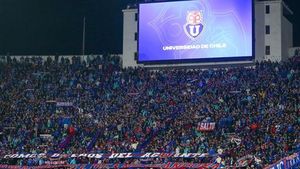Televisión Española (TVE) is making significant adjustments to its programming strategy, aiming to consolidate its audience in key time slots. Following notable moves such as the addition of David Broncano to access prime time and the upcoming launch of La familia de la tele featuring former members of Sálvame to rejuvenate the afternoon segment, the network is now turning its focus to the mornings.
In this context, the signing of Javier Ruiz as the new co-host of Mañaneros marks a pivotal step in reformulating the morning show on La 1 to better compete with Ana Rosa Quintana's return to Telecinco. Ruiz, a seasoned journalist with extensive experience in television and radio, will share the stage with Adela González. This new format is expected to adopt a more informative and political approach, as reported by TVeo and confirmed by EL CONFI TV.
The strategic shift is clear: the intention is to compete more directly with the popular program Al rojo vivo on La Sexta and to recapture the essence that made Ruiz a prominent figure in morning television during his tenure on Las mañanas de Cuatro.
Since Adela González took over in September 2024, Mañaneros has managed to improve its audience numbers, peaking at a 10% share in October and November. However, the fierce competition from Ana Rosa's comeback has led to a decline, with the program's audience share dropping to 8.6% in March 2025, positioning it as the fourth option in its time slot. This decline has prompted TVE's leadership to take action.
Moreover, the challenge for TVE extends beyond stabilizing the main morning show; it also aims to revamp Extra mañaneros, which airs between 14:15 and 15:00 and currently holds a disappointing share of around 6%, significantly below expectations and nearly four points under the network's average.
With Ruiz's addition, the goal is to provide more analytical and current content, giving the morning show a more defined identity that resonates with a broader audience through political analysis and debate. This new direction aligns with the changing landscape of morning television, where audiences are increasingly seeking a balance between information and entertainment.
For Javier Ruiz, this role represents a return to TVE as a presenter after previously directing and hosting Las claves del Siglo XXI, a prime-time debate format that aired in 2022 but struggled to gain traction. Despite the program's inability to establish a solid viewership, Ruiz has maintained a presence at the public broadcaster through collaborations on shows like La hora de La 1 and Hablando claro, and he has made occasional appearances on Mañaneros.
His return to the morning slot, where he previously excelled, is seen as an opportunity to revive one of the weakest segments of the public channel at this time. Ruiz's definitive incorporation into Mañaneros coincides with the arrival of another significant journalist at TVE, Jesús Cintora, who will host Malas lenguas on La 2, a current affairs program aimed at debunking rumors and fake news with a humorous touch.
Both Ruiz and Cintora have previously been key figures in Mediaset's morning offerings, and their return to public television comes at a time when RTVE is striving to solidify its role as a reliable source of information.
The shift towards a more politically focused Mañaneros is not accidental. With several collaborators from the entertainment world moving to La familia de la tele, the morning show has the potential to establish itself as an informative reference within La 1's programming. However, this approach carries risks: morning audiences are looking for a blend of information and entertainment. The resurgence of Ana Rosa on Telecinco and the solidification of Al rojo vivo on La Sexta illustrate that the competition is fiercer than ever, with Susanna Griso fluctuating between both shows in the ratings this season.
Javier Ruiz now faces the challenge of demonstrating whether his style can attract a viewership that has proven to be volatile in recent months. He will have the advantage of sharing a similar audience profile with La hora de La 1, hosted by Silvia Intxaurrondo, which could help bolster the new political focus of Mañaneros.
However, the competition will not be easy, as Antonio Ferreras has established himself as a leading figure in this domain during the same time slot. As TVE navigates through these changes, the hope is that the new direction will not only stabilize viewership but also redefine the landscape of morning television in Spain.
In summary, the strategic overhaul of Mañaneros with Javier Ruiz at the helm reflects a broader effort by TVE to adapt to the evolving television landscape, where political discourse and informative content are increasingly in demand. As the network seeks to reclaim its audience, all eyes will be on how these changes unfold in the coming months.






